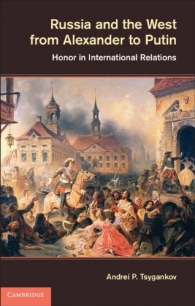Interview
Russia’s foreign policy has been in the center of world attention since the country emerged as a great power. In his book Russia and the West from Alexander to Putin: Honor in International Relations, Andrei Tsygankov, Professor at the Department of Political Science and International Relations, San Francisco State University, argues that Russia’s sense of honor is the key to understanding the long history of the country’s relations with the West.
Interview
Russia’s foreign policy has been in the center of world attention since the country emerged as a great power. In his book Russia and the West from Alexander to Putin: Honor in International Relations [1], Andrei Tsygankov, Professor at the Department of Political Science and International Relations, San Francisco State University, argues that Russia’s sense of honor is the key to understanding the long history of the country’s relations with the West. Russia’s interests in security and development have been determined by how they relate to this sense of honor, while various concepts of honor have helped build policies toward the West. Russia is willing to cooperate with the West only if it believes that Western countries respect its idea of honor. Without factoring this in, Russia becomes either defensive (moderate isolation) or offensive. The book analyzes 10 key periods in the history of Russia’s relations with the West during the past two centuries, and formulates a theory regarding its foreign policy combining the achievements of realism and constructivism.
Dr. Tsygankov, your book Russia and the West from Alexander to Putin: Honor in International Relations, written in English, defines honor as the key motif for Russia’s international behavior. Could you please expand of the idea?
In my research I use a modified definition from James Bowman. In international politics, honor is related to a state’s readiness to defend its dignity and obligations as regards a major social community, either domestic or external. Honor means setting standards for behavior and affects the government decisions to no less extent than so-called national interests. Just like individuals, states do not live by bread alone. They need a mission, an idea and values, i.e. values partially expressed by a sense of honor. Recently, foreign relations literature has grown increasingly interested in nonmaterial categories, such as reputation, status, prestige, emotions, etc. Honor is related not only to the struggle for security, power and prestige but also to the protection of domestic socio-cultural institutions.
Could we say that the sense of honor gives us a way of understanding Russia?
I hope so, since the entire content of the Russian sense of honor helps us understand the country’s activity on the international stage. Each state is striving to defend its ideals of honor and dignity in world politics, partially determined by the structure of the international system and the subsequent struggle for power, prestige and security. However, each group of people or cultural-ethnic community, especially one as large as and significant as Russia and the Russians, historically, acquires its own concept of honor based on its own socio-cultural experience. According to Russian emigration thinker Georgy Fedotov, “each nation has its motherland, while only we have Russia.” The Russian idea of honor is something special. Apart from great power statehood, it incorporates the Orthodox communal idea of transethnicity, strong state and economic justice. As is well known, in the 19th century, Russia waged wars not just for expansion but also for the honor and dignity of the Orthodox faithful in the Balkans. Although greatly different from the traditional Russian idea, the communist idea contained motivational components of honor and justified the need to support foreign communist parties not only by considerations of statehood. Exposing components of honor in the post-communist period is complex, but without it one cannot fully comprehend modern Russia’s foreign policy.
You name three models for Russia’s behavior toward the West specific to various historic periods, i.e. cooperative, defensive and self-confident behaviors. Which elements prevail today? How would you describe the current relationship between Russia and the West?
In my book I mention three models of the Russian state’s behavior in the world in connection with modifications to the idea of honor in Russia’s history. These modifications tally with variations on the concept of honor in the Russian language relating to senses of commitment, dignity and glory. I deal with honor-commitment, honor-dignity and honor-glory, which are transformed into policies of cooperation, moderate isolation and offensiveness toward western countries. Policy choice is determined, firstly, by whether the West recognizes Russian interests and the idea of honor, and, secondly, by Russia’s internal confidence and readiness to maintain the legitimacy of its perception.
These models of relations with the West can be traced back through two centuries since Napoleon’s defeat. Examples of the cooperative policy include the Holy Alliance after the Napoleonic wars, collective security in the 1930s, the Entente, the anti-fascist alliance during World War II, and the war on terrorism in the 21st century. Largely due to existence of a common threat, in each of these cases, the west temporarily accepted Russian interests and ideas, and Russia built relations with the west guided by honor and commitment to its international obligations. When Russia’s concepts of honor-commitment were not accepted, Russia became moderately isolated (if domestically weak), launched an offensive (if domestically forceful and confident) or maneuvered. By moderate isolation I mean Russia’s period of concentration after the defeat in the Crimean War in the mid-19th century, peaceful coexistence after the defeat of the idea of global revolution, and Evgeny Primakov’s attempts at fixing flexible alliances when he was Russia’s foreign minister. Offensiveness can be illustrated by Russia’s behavior in the Crimean War, the Cold War, and the conflict with Georgia.
As far as Russia’s modern policy is concerned, I have attempted to describe and explain it in another book translated into Russian, i.e. Russia’s Foreign Policy: Change and Continuity in National Identity. Today, Russia seems to be largely maneuvering, trying to synthesize various principles and behavior models. I feel this drive is related both to the inconsistent approach of the United States and European Union toward Russia and the country’s relative domestic weakness (terrorism, rising ethnic nationalism, corruption, slower economic growth). For example, Dmitry Medvedev’s policy of building modernization alliances mainly hinged on an understanding of the nation’s energy dependence during a global economic crisis. This policy was a new version of honor-commitment, whereas Vladimir Putin’s current policy reminds of the importance of honor-dignity and honor-glory, due to the tough response to the Magnitsky Act and temporary admission of Snowden to Russian territory. Putin is not against cooperating with the West provided it is on terms beneficial to Russia. At the same time, he has an independent agenda (the Eurasian Union, a special relationship with China and certain Middle Eastern states) and, given sufficient resources, is prepared to advance it.
How would you assess perception of Russia by Western politicians and foreign policy experts?
Western politicians perceive Russia either as a strategic adversary or a country that does not deserve a meaningful partnership. The U.S. and European political elites boast only a few supporters of large-scale mutually beneficial partnership. Most consider Russia a weak and essentially second-rate country, except for nuclear weapons, resources and territory. Regrettably, this is the image of our country built both by Russophobic media and Russia itself due to its corruption problems, corporate raiding, growing ethnic nationalism and managed democracy. The academic community has a more intricate structure but is also dominated by skeptics rather than those who sympathize with the Russian’s policies state or believe in its resurrection.
What do you think should be done to shape Russia's favorable image in the world? Or is the foreign policy image not really essential for building a constructive relationship with the West?
Russia's image does need improvement, although this is very difficult and cannot be done with the help of soft power instruments, since Russia is not Georgia but a huge transcontinental country with a complex assortment of interests and values that are substantially different from those in the West and require clear-cut definition and protection. Wasting funds on political forums and inviting Western pundits to improve Russia's image seems less than rational, especially in an attempt to influence those who are originally anti-Russian. It appears much more effective to help those who are sure about Russia’s importance and goodwill. Such forces must be singled out and assisted in their survival and growth. By no means less important is eradicating the grounds for the poor image back home because a successful foreign policy always rests on successful domestic changes.
Finally, concerted efforts are needed to form the internal content of Russia's image. Although important, PR-people and image-makers will be of no help here as their job is polishing and promoting existing assets. What needs to be done is to create an image that incorporates the best components of Russian honor without challenging the West. Except for during the Soviet period, Russia has never formulated its values as anti-Western, while promoting and protecting those traditionally respected in Western countries, i.e. Christian humanism, interethnic dialogue, a strong state and social justice. So, the thing to do seems to be to develop a new synthesis of these values that is acceptable for Russia. They have a lot of universal components, which should make their future protection and worldwide promotion easier.
1. Tsygankov A.P. Russia and the West from Alexander to Putin: Honor in International Relations. Cambridge: Cambridge University Press, 2012. 325 p.
Interviewer: Natalie Yevtikhevich, RIAC Program Manager





